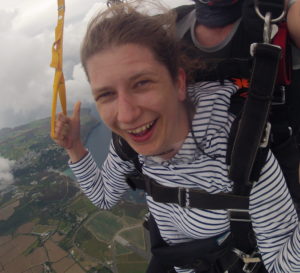Meaghan Castledine (@mcastledine96) is a 3rd year PhD student based in CLES at the University of Exeter, Penryn campus. Her research, funded by the Medical Research Council, explores the evolution of microbial interactions in community ecology and medicine. She has studied here since an undergraduate in 2015 and has settled into Cornish life. She loves taekwondo, reading and, most importantly, dogs.
“I’m really sorry to bother you…”
“I know you’re really busy but…”
“Please can you help…”
“Help…”
Developing an academic support network is hard and made harder in a time when knocking on someone’s door or hovering by someone’s desk is no longer a possibility. Offices that once facilitated support are now quiet ghostly places. The casual support groups we formed over cups of coffee have become strained by dedicated online calls. Especially for new students, asking for help has become significantly harder: who do you ask? Who has the time, or willingness, to share their skills?
I’ve been incredibly lucky, and remain grateful to, a number of mentors who took me under their wings at each stage of my academic learning curve. These were mentors who were not assigned to me by the university, but rather people who personally volunteered to share their skills and knowledge with me.
At undergrad, two postgraduate students taught me how to write essays, develop ideas and work in a laboratory. At PhD, a post-doc – Dr Daniel Padfield – has taught me how to code and analyse my data. Although the foundations for each of these skills were laid in my degree training, these mentors helped me refine my skills and gave me more confidence than any course or module could.
Since the pandemic started, translating such social interactions to an online setting has stunted the development of these casual support networks. To address this, we may, as a research community, need to advertise our skills more explicitly among our peers.
A recent initiative by Dr Daniel Padfield is an exemplar of how support networks may be set up in the current climate. As a coding and statistics expert, Dan is a “go-to” for those who need extra help. To make himself more accessible to students who may be too shy to privately approach him, Dan set up weekly help sessions in the medical school where students can drop in. These, in effect, replace the casual office atmosphere where people would drop by Dan’s desk to ask for help.
Opening up such sessions need not be a place where individuals have their work done for them. Instead, staff and students can learn how to overcome hurdles and barriers to their learning. Sometimes those barriers come from self-confidence and having a supportive peer can help them overcome that block. Personally, I now tutor undergraduates in statistics; helping students work-through their problems and relaying my own past struggles has helped some students drop the adage that they are simply “useless” at statistics.
Sign up to be a mentor/tutor, check in on your peers, set up a dop-in session. Sharing skills and knowledge is at the centre of what it means to be a researcher. If we are to encourage the next generation of scientists then we need to develop support networks between all levels of academia: from undergrad to masters and PhD, post-doc and beyond.


